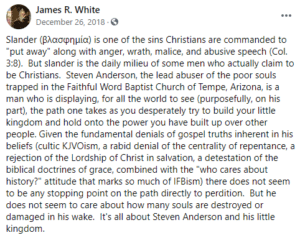In some recent public comments, Steven Anderson (a Phoenix-area “pastor” who is an iconic example of the cultic side of King James Onlyism) took some jabs at Christian apologist Dr. James White and, inadvertently in the process, at the King James Bible as well. While it was obviously far from Anderson’s intention to undermine the KJV, the accusations he carelessly hurled at Dr. White, if taken seriously, would actually apply to his favorite 1611 translation as well, undermining it as heretical. Thus, it is worth briefly looking at Anderson’s comments, not only to note the faulty kind of thinking that so often lies behind radical King James Onlyism, but also to, ironic as may be, defend the King James Bible against the comments of a King James Onlyist.
The comments in their context
Leading up to the comments at which we will be looking here, Anderson had already made several public accusations against Dr. White and against Pastor Jeff Durbin (another Phoenix-area minister of the gospel.) As part of his public response to Anderson’s initial comments, Dr. White wrote:

Anderson latched onto this portion of White’s response, and rebutted:

So eager was Anderson to try and “catch” Dr. White in some heresy that he failed to consider how the KJV itself renders the Greek term “βλασφημία” or even how it sometimes uses the English word “blasphemy.” He also demonstrated yet again how modern readers are often confused by the KJV’s use of words. It’s not that the KJV itself is wrong in such places, but rather that the English language has changed over the last 400 years and men like Anderson are often mistaken about the meaning of a verse because they read contemporary American usage into words that had a different range of meaning in 1611 (see our series on that subject The King James Version and the Changing Use of Words).
βλασφημία in the KJV
The Greek word “βλασφημία” (blasphemia) is where we get our English word “blasphemy.” The Greek word means to “revile,” “slander,” or “speak ill of.” According to Anderson’s comment, not only the English word “blasphemy” but also the Greek word behind it “βλασφημία” ought to be applied only to God. While he at first qualified this by saying that it “typically” has to do with speaking against God, he goes on to say that for James White to translate the word βλασφημία as “slander” and to apply it in even just this one context to a man speaking ill of another mere man is necessarily to deify the man. Thus, when Anderson walks out his accusation, the word “typically” is negated. If someone ever applies the word βλασφημία to anyone other than God, Anderson says they must be deifying that person.
So, how do the King James translators hold up under Anderson’s novel standard of orthodoxy? If we take Anderson’s claim seriously, the KJV not only deifies men, it actually deifies the devil! Note these words of Jude:
“Yet Michael the archangel, when contending with the devil he disputed about the body of Moses, durst not bring against him a railing accusation, but said, The Lord rebuke thee,” (Jude 1:9, KJV).
“Railing accusation” is the KJV’s translation here of βλασφημία. Thus, like White, the KJV translates βλασφημία with a phrase other than “blasphemy” and applies it here to speaking ill, not of God, but of the devil. If White is making men gods by translating the word “βλασφημία” as slander and applying it to the evil things men say of other men, then the KJV translators are obviously honoring Satan as God by translating βλασφημία as “railing accusation” and applying it to words spoken ill of the devil. Indeed, one could take this a step further and accuse Jude himself of deifying the devil by using the word βλασφημία here in the first place! Clearly, none of this is true. Neither Jude nor the King James translators worshipped the devil as a god and Dr. White does not claim himself or any other mere man to be a god. Anderson’s accusation is ludicrous. The point is simply that the accusation which Anderson intended to undermine Dr. White also turns out, if actually taken seriously, to undermine the KJV as well.
Blasphemy in the KJV
Let’s take this a step further. Would it be a problem to apply even the English word “blasphemy” to slanderous words against a mere man rather than God? Now, of course, Dr. White did not do this. He used the English word “slander,” not “blasphemy,” but the translators of the KJV were not always so guarded in their wording. Note, for example, this cry of the Psalmist:
“Thou makest us a reproach to our neighbours, a scorn and a derision to them that are round about us. Thou makest us a byword among the heathen, a shaking of the head among the people. My confusion is continually before me, and the shame of my face hath covered me, For the voice of him that reproacheth and blasphemeth; by reason of the enemy and avenger. All this is come upon us; yet have we not forgotten thee, neither have we dealt falsely in thy covenant,” (Psalm 44:13-17, KJV).
Who is made a reproach to their neighbors? Not God but rather “us.” Who is a scorn and a derision to those around them? Who is a byword among the heathen? Again, not God, but “us.” So who, in this context, is the target of “the voice of him that reproached and blasphemeth”? Who is the one being blasphemed? Again, not God, but the Psalmist and the righteous remnant with which he identifies. Note, immediately after mentioning the blasphemy, the Psalmist says “all this is come upon us.” The blasphemies of their enemies are one of the things that have come upon them. They are the ones being slandered and reviled here, not God. They are appealing to God to deliver them from those who accuse and blaspheme them. To us today it may sound strange to speak of blaspheming people. We may even find ourselves tempted to contort the passage so that, while all the other synonyms present refer to reviling words directed at men, somehow “blasphemeth” is talking about speaking ill of God, but that is obviously not what the author or the translators intended in this Psalm. “Blaspheme,” though often applied specially to words spoken against God, simply meant to slander or speak reviling words and could rightly and naturally be applied to slandering people as well. The King James translators were not deifying the psalmist or the ancient Israelites by describing words spoken against them as “blasphemy,” and neither was Dr. White deifying men when he denounced slander toward men. Anderson’s logic just doesn’t hold. And again, if it did, the KJV would then need to be rejected as heretical.
Let evil speaking be put away from you
It is, indeed, a sin to slander and tear down another person with reviling words. Paul writes:
“Let all bitterness, and wrath, and anger, and clamour, and evil speaking, be put away from you, with all malice,” (Ephesians 4:31, KJV).
Along with bitterness, wrath, anger, and malice toward one another, Paul also tells us to put off “evil speaking.” This clearly means speaking evil of one another. Indeed, note the counterpoint that Paul follows this verse up with:
“And be ye kind one to another, tenderhearted, forgiving one another, even as God for Christ’s sake hath forgiven you,” (Ephesians 4:32, KJV).
Throughout Ephesians, Paul often argues his point by forbidding a certain sin and then commanding its opposite instead. Here, the opposite of “evil speaking” is being “kind one to another.” Thus, the “evil speaking” which Paul is addressing here is particularly speaking ill of one another. The issue is slander. This is interesting because the word translated here in the KJV as “evil speaking” is, once again, “βλασφημία.” Paul does not only command us not to commit βλασφημία against God, he also forbids us to commit βλασφημία against one another. This obviously does not deify “one another.” It simply means that Dr. White was correct that βλασφημία can mean slander of our fellow man or speaking evil of one another. Indeed, note the particular verse that Dr. White referenced in his original comment:
“But now ye also put off all these; anger, wrath, malice, blasphemy, filthy communication out of your mouth,” (Colossians 3:8, KJV).
White translated the word here as “slander,” but the KJV uses the word “blasphemy.” What did Paul mean? Was he talking about speaking ill of God or of others? Well, it seems that he meant the same thing he did in Ephesians, in the verse we just discussed. Note that in both verses, Paul instructs his readers to put off/put away anger, wrath, malice, and βλασφημία (evil speaking/blasphemy). And just as we saw in Ephesians 4, Paul follows up his warning to the Colossians with the positive counter-instructions:
“Put on therefore, as the elect of God, holy and beloved, bowels of mercies, kindness, humbleness of mind, meekness, longsuffering; Forbearing one another, and forgiving one another, if any man have a quarrel against any: even as Christ forgave you, so also do ye,” (Colossians 3:12-13).
Both passages focus on our kindness and compassionate treatment of one another. Both passages even contain the same “forgive one another as Christ forgave you” conclusion. The focus in both passages is on our treatment of one another. Thus, the “blasphemy” forbidden in Colossians 3:8 is not restricted to speaking ill of God. The particular focus in this context is on slander and evil speech toward other people. When the King James translators used the word “blasphemy” here, they again were not wrong to do so. The word simply meant slander or reviling speech. Today, however, modern readers tend to understand “blasphemy” in a much narrower sense (which is presumably what led to Mr. Anderson’s confusion here). This is why Dr. White translated it as “slander,” a word that is clearer to the contemporary reader. Either way, Dr. White was correct in his understanding and application of this verse. Anderson, on the other hand, while misunderstanding the verse, took the opportunity to violate its teachings yet again by slandering Dr. White and falsely accusing him of heresy. This entire incident actually demonstrates one of the reasons why, while the KJV is a fine translation that ought not to be maligned, there is great value in having the freedom to cross-reference its readings with other translations to be sure we understand what we are reading. It also reminds us that the kind of arguments that generally flow from the radical, cultic side of the KJVO movement represented by Anderson can’t be taken seriously without undermining the very Bible version they wish to defend. Don’t be deceived. He who shouts loudest is not automatically right. Passion and vitriol cannot replace substance.





